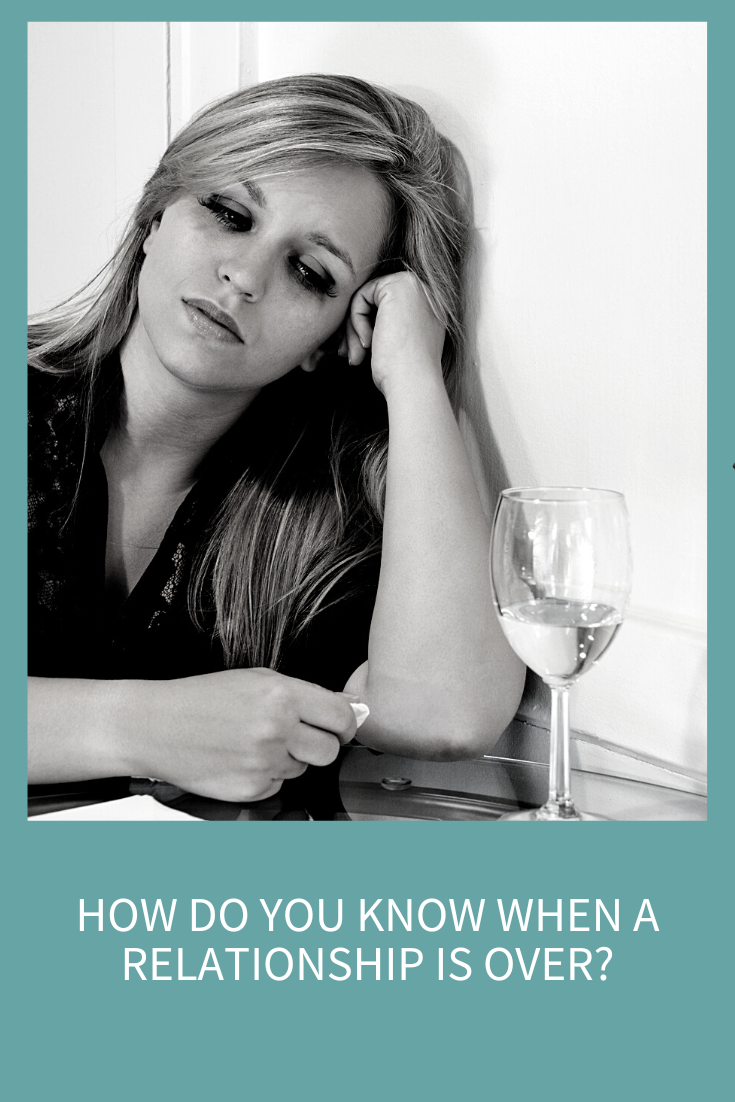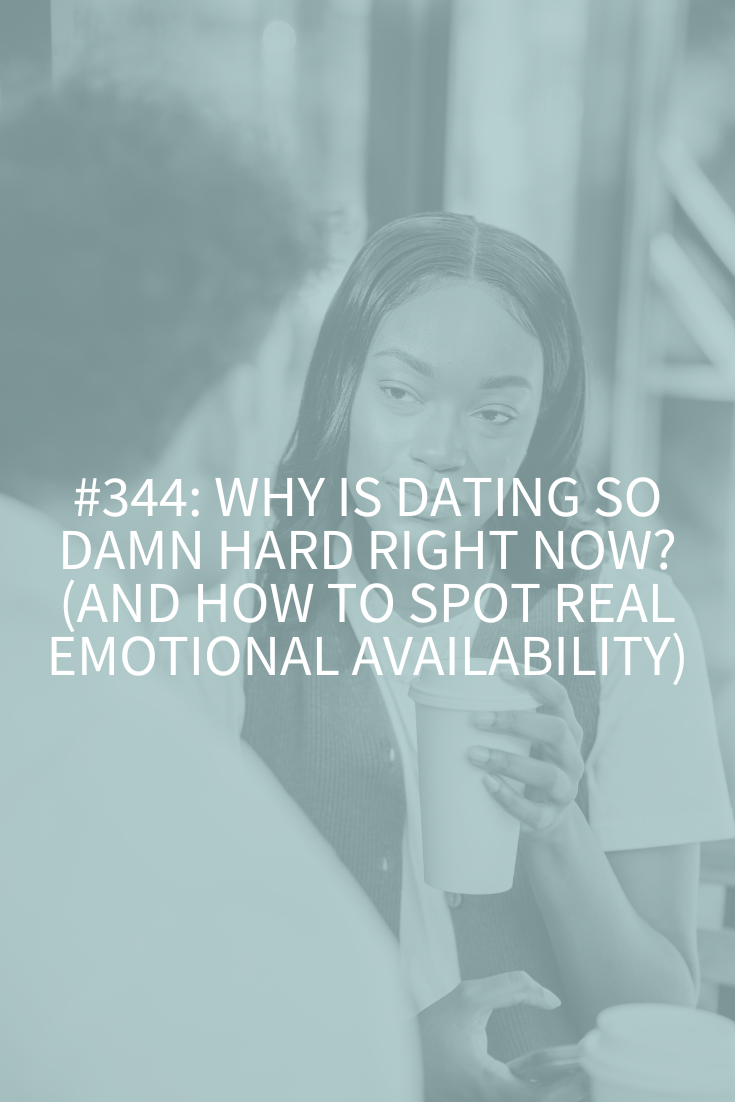
Have you been thinking it’s time to call it quits in your relationship, but maybe you’re wondering if you’re quitting too soon or wanting to leave for the wrong reasons? It can be hard to know when a relationship “should be” over. Today I’ll be sharing the top five signs that a relationship might be over.
8-minute read
Before we jump in, let me say that having any one of these signs for a short period of time isn’t a signal to break up. In the same vein, if you have one of these signs but no others, it’s not a signal that it’s time to look for a new place to live. As with all things, it’s up to you to see which of these signs is a deal breaker for you and, if it is, what you want to do about it.
Some people stay in relationships, despite these things, because of finances, kids or any other number of factors, and I’m not here to judge you. I’m here to discuss these signs so you can have a more honest and real perspective on your relationship. From there, it’s up to you to decide what to do. I would also highly recommend seeing a trained therapist before making any final decisions.
My hope in giving you this perspective is that you’ll be proactive in some way if you see these signs in your relationship and know that you can make changes to make your life (and maybe even your relationship) better.
Here are my top five signs that a relationship may be over.
Sign #1: Contempt
Marriage researcher John Gottman has described what he calls The Four Horseman as the death knell for relationships. These four areas are criticism, defensiveness, stonewalling and contempt. His studies have shown that, of these four, contempt (which shows up as disgust, eye-rolling, ridiculing or dismissal) is the greatest predictor of divorce.
I hope that every person listening will see contempt as a deal breaker. What are you doing in a relationship where you feel overwhelmingly annoyed by this person and feel constant resentment? Again, I’m not talking about an occasional resentment or frustration with our partners. I’m talking about something deeper. With contempt, there’s a feeling that the other person is worthless and beneath you. Because of this, there’s a complete disregard for the other person’s feelings or humanity in general. There’s literally a feeling of disgust when the other person enters the room or attempts to have a conversation with you.
Now, this might also be happening to you. Your partner might ridicule you in front of others, roll their eyes when you’re trying to make a point or even tell you to shut up if you tell them you’d like to talk about something. There’s a quality of open disrespect in the relationship.
I will say, when I see contempt in a relationship, it’s a very difficult thing to move past because it signifies a time in the relationship where there’s no longer respect, kindness or care. Without those things, it’s hard to find the motivation to make changes.
Sign #2: Disrespecting Values
Another sign is when one partner doesn’t respect the other’s values. If you’re in the very beginning of a relationship and you’re seeing that your values don’t align, I would lovingly tell you to run, not walk, away. However, you might be years deep in a relationship and more recently noticed that values have changed.
I’ve seen this happen, for example, when a person in a couple starts making a lot of money or suddenly work becomes the most important thing when it wasn’t that way originally. Or maybe your partner has become a social climber or someone who’s more interested in material things than they were initially. Or maybe neither of you was very interested in religion, but now that you’ve had children, your partner has become more religious.
People grow and change over the years of a relationship and values are one of those things that might. The issue, of course, is when one person’s values change and the other person’s doesn’t. When one person doesn’t respect the other’s values, you end up without a shared idea of how to make decisions or long-term goals, which is a huge issue in any relationship. There’s no support for one another’s goals or what’s important to the other person, and possibly even disdain about what the other person finds important.
Get 3 action tips to help you find common ground and peace when you and your partner have different spiritual beliefs.
Sign #3: There’s No Team
When there’s no team, there’s no trust. When there’s no trust, there’s no vulnerability, and without vulnerability, there’s no true emotional connection or intimacy. If all these things are absent, I’m not sure you’ve got a romantic relationship or partnership at all.
I speak a lot about the issues of keeping score and setting yourself up on opposite sides. When you’re not on the same team, you end up competing. You compete for resources like money and time, and we all know that if it’s a competition, you want to win and you want the other person to lose! Now you’ve got a big problem. You have a relationship where you don’t celebrate each other’s wins and even show jealousy when good things happen for the other! When there’s no team, you take pleasure in your partner being hurt (or they with you), and there might be revenge-plotting with your partner.
Sign #4: Being Together is Draining
When I walk in my home, I always have a sort of exhale. I’ve made it! I’m in my safe place where everyone supports me. How do you feel when you walk into your home? Are you driving there thinking of ways to avoid going in the house? Are you always readying yourself for battle before you walk in the front door? Do you just want to be left alone and not have your partner “bug” you?
Or maybe dinner often feels like a drag, or going out for the day feels exhausting when you think of the entire day with your partner. Overall, think about your daily interactions with your partner. Are they consistently enervating or draining?
Being with your partner should be a safe place where you recharge your batteries, where you feel connection, joy and ease the majority of the time. Sure, we all get annoyed with our partners or feel drained every now and then when things are hard but, overall, how do you feel on a daily/weekly basis? When you think of them or spend time together, are you energized and replenished or drained and exhausted?
Sign #5: There’s No Communication at All
This could either show up as not talking about anything ever, so complete apathy and silence or, when you do try to talk about something, it ends up confrontational, aggressive, mean or defensive only.
I work with a lot of people who fight often with their partners but, they also report times when things feel good, when they can sit down together and really hash something out. What I often see is that couples might be fighting over who’s taking out the trash and little things, but then when it comes to big decisions like where to send their kids to school or where to live, they’re able to come together and make decisions even when they don’t agree.
For these couples, there is still communication (although maybe not enough), but they are able to do it from time to time.
As I’ve said before, I think couples are often saying they “don’t communicate” because they’re not acting as a team and, instead, are pitted against one another so, of course there’s a breakdown in communication! I’m trying to win, not collaborate! In my experience, if you work on the team aspect, you can quickly have better communication.
To me, seeing yourself as a team is the fulcrum, the lever by which all the rest gets better. So if you’re wondering where to start in trying to turn a relationship around, I would recommend starting there.
Wrap Up
Lastly, if you’re listening right now and thinking, “Oh my gosh, this is us!” I don’t want you to panic or feel like crap. Instead, I want you to take this seriously and get yourself to an individual therapist ASAP. This is not necessarily a time for couples work. It’s a time for you to do some individual work and assess how you let the relationship get to this point. Do you have low self-esteem or self-confidence and that’s why you’ve been afraid to leave? Did you see warning signs but have ignored them? Are you the one acting in some of these ways? Do you need to look at your resentment, blame and anger?
I find that many people go to couples too quickly. It’s always important to start with yourself and to begin to answer some questions about your responsibility in this relationship before focusing on your partner or the couple.






